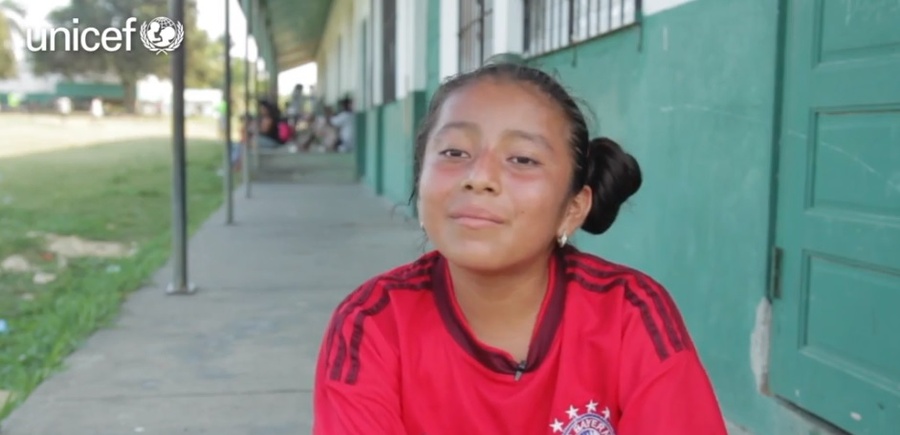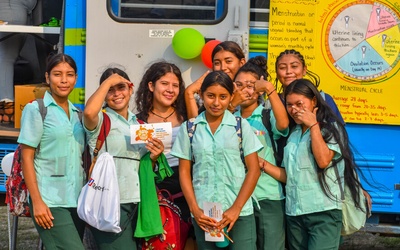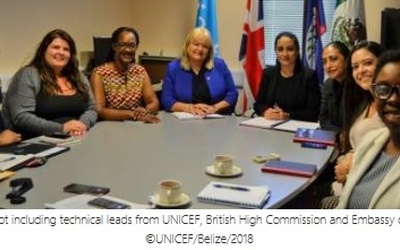RISE Above: The Child Development Foundation

Two teams of boys and girls are enjoying a volleyball match on a warm afternoon in the tiny courtyard of their school. For these children it’s a rare chance for a bit of exercise and fresh air, even if that air carries the constant aroma of marijuana wafting over the barbed-wire-crowned wall of their inner city school compound, on the south side of Belize City. Service is whistled in. The ball lobs over the imaginary net dropping just on the other side of the crack in the pavement that serves as the back line. “Serve again,” encourages the coach, and why not? No one is keeping score. It all looks like good fun, and it is. However, this is more than just fun and games.
This particular group of students from Salvation Army Primary School in Belize City belongs to their school’s RISE club. RISE (Reviving Initiative Supporting and Engaging youth) is an effort of The Child Development Foundation (CDF), a non-profit social justice organization based in Belmopan. With the support of UNICEF Belize, CDF coordinates 14 RISE clubs: ten in the nation’s capital of Belmopan and four in Belize City. The objective of CDF is to prevent physical abuse and sexual exploitation of children, while helping young people discover their full potential. In Belize City in particular, sport is proving to be an effective way to reach children most at risk.
“Southside Belize is known as a gang area. You have to be tough, you have to pick a side,” explains Telesha McKay, who became a CDF volunteer while in high school. Today she is employed full time by the organization as a project coordinator. “We are trying to figure out if [children] are taught that you have to be a certain way to survive, or if their behaviour is because someone has done something to them and they feel they have to put up an angry appearance to shield them from getting hurt.”

11-year old Anna Alvarez knows about anger issues. She admits that, before her joining a RISE club, she used to get into fights nearly every day. Watching her on the playground, it is hard to imagine this happy young girl getting involved in an angry confrontation. “Anna is one of the most outgoing children, but she used to have a very light trigger,” explains youth trainer Brandon Marsden. He has been working with Anna and scores of other young people in Belize City RISE clubs for the past eight months. “Before, if anything triggered her, she would snap and quarrel with anyone. Since she got involved in the RISE club, she has learned to become a better person; she has learned to ignore the negative things people may be saying about her.”
While the children may learn to ignore negative words, one of the objectives of RISE clubs is to make young people more aware of the threats to their personal security, in particular physical abuse and sexual exploitation. When asked what she worries about, Anna’s attitude changes from light-hearted to dead serious. “There are some men who like to rape kids” she says.

It’s not just the girls who are aware of these dangers. Across town, at Queen Street Baptist Primary School Rise Club, 13-year-old Andy Hernandez echoes Anna’s concern: “A lot of kids are getting abused now and it’s good to learn to protect ourselves.” Andy has 7 siblings. The RISE club provides him with an opportunity to enjoy recreation while learning valuable life lessons. “They teach us about abuse, but also about sports and sportsmanship. I like the RISE club because it’s fun!”
And fun it indeed, but with a purpose. According to Telesha, sports give CDF the opening they need to reach children with their messages. “One of the goals of sports for development is the concept of rules and concept of rights. What you can do and what you can’t do. We all know sports has its own set of rules and so does life.”

According to Talesha and Brandon, about 50 per cent of the students participating in RISE Club were selected by their teachers and principals because of either anger issues or concerns for them being at-risk youth. Over a few months, facilitators have seen dramatic changes in the children participating in the club. “There has been a shift in the kids we come into contact with,” explains Talesha. “First they are wondering if they can trust you and then, over time, the kids will come to you and say, ‘This is happening...’”
Kenisha Flowers is an 11-year-old. She credits the RISE club for teaching her how to resolve conflict without resorting to violence. “If you hit someone that is violence,” she says. “Before I was part of the RISE club I was the one who showed that attitude, but I am trying to change it. Fights are something that causes abuse. If a person is pushing you, you just ignore them because it could get out of hand.”
Learning to deal with conflict has also helped Kenisha handle a serious situation faced by many young people. “I have been bullied,” she confesses. “These people want to break you down. If you are being bullied don’t get mad, just forgive them. If they are bullying you, it’s because they want to be like you.” “Hurt people hurt people,” adds Telesha. “Most of these kids will say that they have been bullied themselves. They just want you to look at them and see that something is wrong.”

“If you are being bullied don’t get mad. Just forgive them.” – Kenisha Flowers, 11, Belize City.
But on this afternoon nothing seems to be wrong, at least for the duration of the volleyball match: smiles and laughter are everywhere. Telesha says it is rewarding to witness the students simply having fun. Many of these children have to share the burden of raising multiple siblings in single parent homes. “Parents mean well by teaching you to be responsible,” she explains, “but I have seen situations where 7-year-olds have to take care of 3-year-olds. It’s a responsibility that is too big for them. Their family dynamics don’t give them the opportunity to be a child.”
Fortunately, more students will soon get the opportunity to just be children. CDF plans to add at least six more RISE Clubs in Belize City schools. Telesha says the strategy is to create a ripple effect in the community. “We can’t reach everyone. We can’t even reach an entire school. But if we can empower 20 kids in one school who know what abuse is, know how to talk to someone, to help someone who is being bullied or abused, then we know there will always be someone who can help someone else. They can help a friend.”

“I like RISE Club because it’s fun.” – Andy Hernandez, 13, Belize City.








